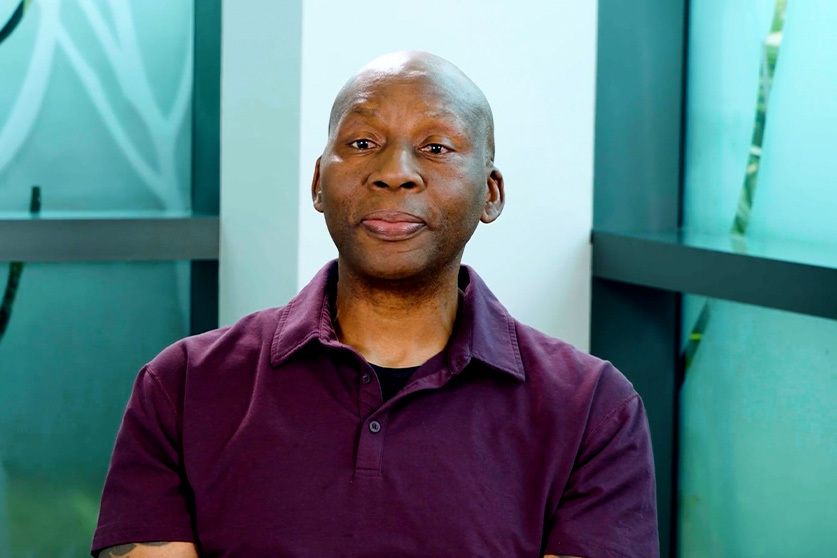
Prostate Cancer
Our multidisciplinary approach helps many people get better and stay healthy with fewer tests and treatments.
Your prostate cancer risk increases with age. But getting older doesn’t necessarily mean you need testing. And if you have a prostate cancer diagnosis, treatment isn’t always necessary. You don’t have to worry about weighing your options at Memorial Cancer Institute.
Our world-renowned experts consider your risks, health history and diagnosis before making recommendations that are best for you. When prostate cancer treatment is necessary, you have access to many of today’s most promising therapies.
Diagnosing Prostate Cancer
We often start by checking prostate-specific antigen (PSA) levels. PSA is a protein in the blood that may be associated with prostate cancer. If PSA levels are high, you may need additional testing, such as imaging studies.
Our program was one of the first in the nation to use PYLARIFY®. This advanced imaging technique detects prostate cancer earlier. We also offer prostate-specific membrane antigen (PSMA) positron emission tomography (PET) scans. This newer option uses safe levels of radiation to detect prostate cancer cells anywhere in the body.
We may also perform cystoscopy. It involves sliding a thin, flexible tube up the urethra (vessel through which urine leaves the body). Instruments at the tip enable us to view the prostate and take a tissue sample (biopsy). A pathologist examines it under a microscope to confirm or rule out cancer.
Prostate cancer typically does not run in families. But genetic testing can let you know whether you are among the few people with a genetic risk for the condition. If you have a prostate cancer diagnosis, we check for mutations that respond to specific therapies. Learn more about our cancer genetics expertise.

Prostate Cancer Risk Factors and Tests
Prostate Cancer Treatments and Support
Many people get better with non-surgical therapies like focal ablation, which destroys cancer using a laser or freezing gas. NanoKnife® is another advanced focal therapy now offered at Memorial. This minimally invasive procedure uses electrical pulses to destroy prostate cancer cells while protecting surrounding healthy tissue. It provides effective treatment with the potential for fewer side effects, similar to a prostate lumpectomy.
Brachytherapy is a radiation oncology treatment where your doctor places tiny radioactive seeds in the prostate that give off radiation to stop cancer cell growth.
Your care may also include cancer medications, such as chemotherapy, immunotherapy, and targeted therapy. We offer the latest medication types and protocols.
When prostatectomy is necessary to remove the prostate, many patients have robotic procedures and go home the next day. Prostatectomy can affect urinary and sexual function. Our urologists are here to help you regain function after surgery and improve your quality of life.
You may also be eligible to receive treatments not yet widely available through a clinical trial.
Supportive Therapies and Services for Prostate Cancer
We offer a range of cancer support services to ease your mind and body during prostate cancer treatment. You may benefit from integrative medicine practices like acupuncture and therapeutic massage. Services also include emotional support from psychologists, nutritional counseling and spiritual care.

Adam’s Triple Therapy Prostate Cancer Treatment
Diagnosed with stage 4 prostate cancer, Adam’s Memorial Cancer Institute team provided an aggressive triple therapy treatment to help him survive.
Prostate Cancer Care: Why Choose Memorial Cancer Institute?
Our program is home to a fellowship-trained urologic oncologist who completed the highest level of training. Another specialist worked at the National Cancer Institute, the nation’s top cancer research agency. Their combined knowledge and expertise lead to high-quality services and exceptional results. Meet our team.
Highlights of our program include:
- Innovation: Our team has pioneered many breakthroughs in prostate cancer care and is a leader in the field. Contributions include using numbing agents during biopsy procedures and preventing urinary incontinence during treatment. Specialists have also trained up-and-coming prostate cancer specialists on advanced surgical techniques.
- Appropriate care: We consider your prostate cancer risk before recommending screening. If you are not likely to have prostate cancer, it might be best to wait. And if you do have cancer, you might not need treatment if it’s growing slowly. Medical oncology instead of surgery might bring the best outcomes when therapies are necessary.
- Robotic prostatectomy: We offer leading-edge prostate cancer treatment, including minimally invasive prostate removal (prostatectomy). After making small incisions, surgeons use robotic surgical technology to carry out the procedure with a high degree of precision.
- Clinical trials: We are advancing prostate cancer care through clinical trials. Our interests include medical therapies for people with multiple cancer types. Clinical trials allow you to receive emerging therapies years before they are widely available.
- Supportive services: We offer a range of services that help you move forward with your life after prostate cancer treatment. Our extended team includes men’s health specialists who help you get relief from concerns like erectile dysfunction. You may also benefit from our men's rehabilitation services.








